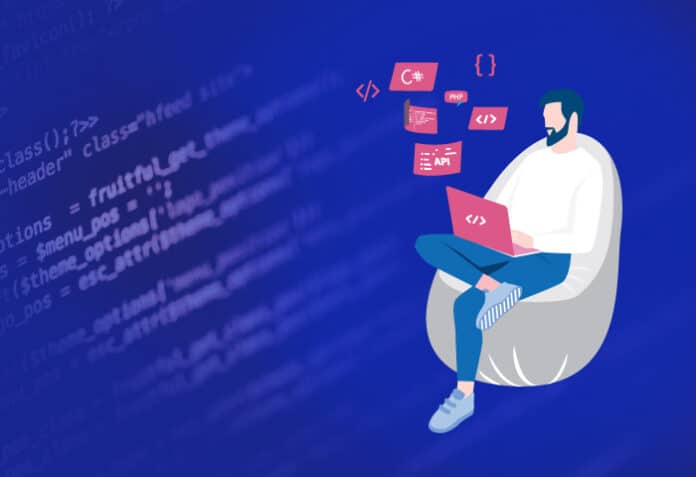Here is some practical guidance on writing high-performance app code. By implementing these best practices, businesses can code their way to a smoother app experience, happier users, and a competitive edge in the current digital landscape.
In today’s digital age, a well-performing app is paramount to the success of any business. Writing code is an essential part of developing any modern application, and it is crucial to ensure that the code you write is structured, optimised and efficient. Poorly written code can have significant consequences such as slow loading times, crashes, and even user frustration.
As the performance of any app highly depends on how well the code is written, adopting best practices is essential to ensure that the app runs smoothly, loads faster, and provides an excellent user experience. Whether you are a seasoned developer or just starting to code, the best practices outlined in this article will help you to improve your coding skills and become a better app developer.
Purpose of implementing coding standards
The purpose of having coding standards is to ensure that code is written in a consistent and maintainable manner, allowing for easier collaboration among team members and reducing the likelihood of errors and bugs. Coding standards also aid code reusability, simplify debugging, and improve application performance. They ensure that code is written with clarity, readability, and standardisation, making it more comprehensible for future development and maintenance. Additionally, these standards facilitate code reviews, reduce development time, and enforce good programming practices.
Reasons for writing clean and efficient code for apps
Readability: Clean code is easy to read and understand. When the code is clean, other developers can quickly understand its purpose and easily maintain it in the future. Clean code also makes it easier for developers to identify and fix errors faster.
Maintenance: Writing clean code reduces the time it takes to maintain the application. An application that uses clean code is more likely to be error-free and easier to maintain in the long run, which can save developers a lot of time and resources.
Scalability: Clean code is more scalable than messy code. Developers can add new features to an application faster and more efficiently with clean code. Also, clean code makes it easier to refactor the code if necessary.
Debugging: Efficient code makes it easier to debug applications, and identify code errors and fix them.
Performance: Efficient code can improve application performance. Writing clean and efficient code can help you avoid memory leaks and performance issues, resulting in a faster and more responsive application.
What you should know before starting app development
Before diving into app development, it’s important to lay a strong foundation. You will need to put some thought into that.
Purpose of the app: Have a clear understanding of the problem your app is solving and the value it adds to users.
Target audience: Understand your target audience to build an app that meets their needs and preferences.
Platform: Choose the platform (iOS or Android) that best suits your app’s purpose and audience.
Competition: Research your competition to identify their strengths, weaknesses and how you can differentiate yourself.
Technical skills: Familiarise yourself with the programming languages, tools, and frameworks required to build your app, or consider hiring professionals to assist you.
Budget: Have a clear idea of the cost involved, including development, design, and marketing.
Marketing strategy: Plan out a marketing strategy to promote your app and reach your target audience.
User experience: Focus on building a user-friendly and engaging app that provides a seamless user experience.
Testing: Test your app thoroughly to ensure it is bug-free and runs smoothly on various devices.
Post-launch support: Plan for post-launch support and maintenance, including bug fixes, app updates, and user feedback.
Best practices for writing code
As technology continues to advance, mobile applications have become an essential part of our daily lives. With users increasingly demanding fast and responsive applications, it is necessary for developers to ensure that the app performs efficiently. Writing code for better app performance is, therefore, a significant aspect to consider. This section examines the best practices for writing code for better-performing apps.
Use efficient coding techniques
Employing efficient coding techniques is critical in developing high-performance apps. One of the most effective techniques is to reduce dependencies. This involves minimising the number of components and functions that rely on other components and functions within the app. Additionally, use simple and concise code syntax to speed up the app.
Optimise resource usage
Resource optimisation is another essential factor in developing an app that performs well. This involves managing the app’s memory usage to minimise overhead. One best practice is to avoid allocating too many resources upfront. Instead, allocate resources dynamically based on need. Also, it is critical to clean up resources after use to minimise memory leaks.
Optimise database access
Database access is an important aspect of app development. By adopting the right database architecture, developers can ensure that their apps are optimised for performance. Reduce the number of unnecessary database queries, use indexing to speed up queries and minimise table joins.
Use multithreading
Multithreading is a technique in which multiple threads perform tasks concurrently. This technique helps to optimise app responsiveness, especially when working with complex tasks or large data sets. By using multithreading, developers can ensure that the app continues to respond to user interactions while background tasks continue to run.
Adopt efficient coding tools
Efficient coding tools are critical in ensuring that the code written produces an app with the best performance possible. These tools help to optimise code syntax, identify performance bottlenecks, and enable continuous code analysis to detect and fix defects. Some effective coding tools include static analysers, performance profiling tools, and code optimisation tools.
Adopt agile development methodology
Agile development methodology involves breaking down complex tasks into smaller, more manageable units. This approach helps to improve collaboration among developers, which, in turn, leads to faster application development and better performance. Using agile development methodologies enables teams to focus on the smaller components of the app, test them frequently, and integrate new features more seamlessly.
To sum up, writing code for better-performing apps requires consideration of various factors, including efficient coding techniques, optimising resource usage, efficient database access, multithreading, and adopting effective coding tools. It also involves adopting a development methodology that prioritises collaboration among developers, frequent testing and integration, and iterative development. By adopting these best practices, developers can develop high-performance apps that meet user demands for speed and responsiveness.
A guide to selecting the perfect app development partner
Choosing the right technical partner for app development is an essential aspect of building a successful app. Here are the steps to follow when selecting one.
Determine your project’s needs: Define what you want to achieve with your app, including its features, budget and timeline. Defining these parameters will help you identify what skills and capabilities you should look for in a technical partner.
Look for experience and expertise: Your technical partner must have experience and expertise in developing apps similar to yours. Check their portfolio and client testimonials to understand their previous work. Consider going through their past projects to evaluate their level of expertise.
Focus on communication skills: Communication is vital when working with technical partners. Make sure to choose a partner that has clear communication skills and can communicate in your preferred way (email, phone or face-to-face meetings).
Technical competence: Your technical partner must possess excellent technical skills, including proficiency in programming languages, app development frameworks, and other development tools. They should also be familiar with the latest trends and technologies in mobile app development.
Assess reliability: Choose a technical partner who is reliable and committed to delivering quality work. Make sure that they follow the deadlines and timelines that are agreed upon.
Evaluate cost and value: The cost of development should not be the only determining factor when selecting a technical partner. Consider the value they provide and their ability to deliver quality results within your budgetary limitations.
In a nutshell, selecting the best technical partner for your app development needs takes time and effort. However, by following these steps, you can ensure that you pick a reliable and experienced developer who can help create a successful and effective app to meet your business needs.
The road ahead
Writing code for a better performing app requires strategic planning and implementation of best practices. Prioritise performance metrics and optimise the code accordingly. Following guidelines such as modularisation, code reuse, and efficient data storage can greatly improve performance and enhance user experience. Continuously testing and monitoring the app’s performance can also help to identify areas that require optimisation. Furthermore, staying informed about updates and advancements in technology can ensure that the app is built with the latest and most efficient practices. Ultimately, adopting these best practices in code writing can significantly enhance the performance, scalability, and usability of an app.




